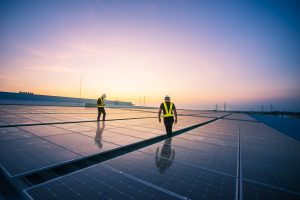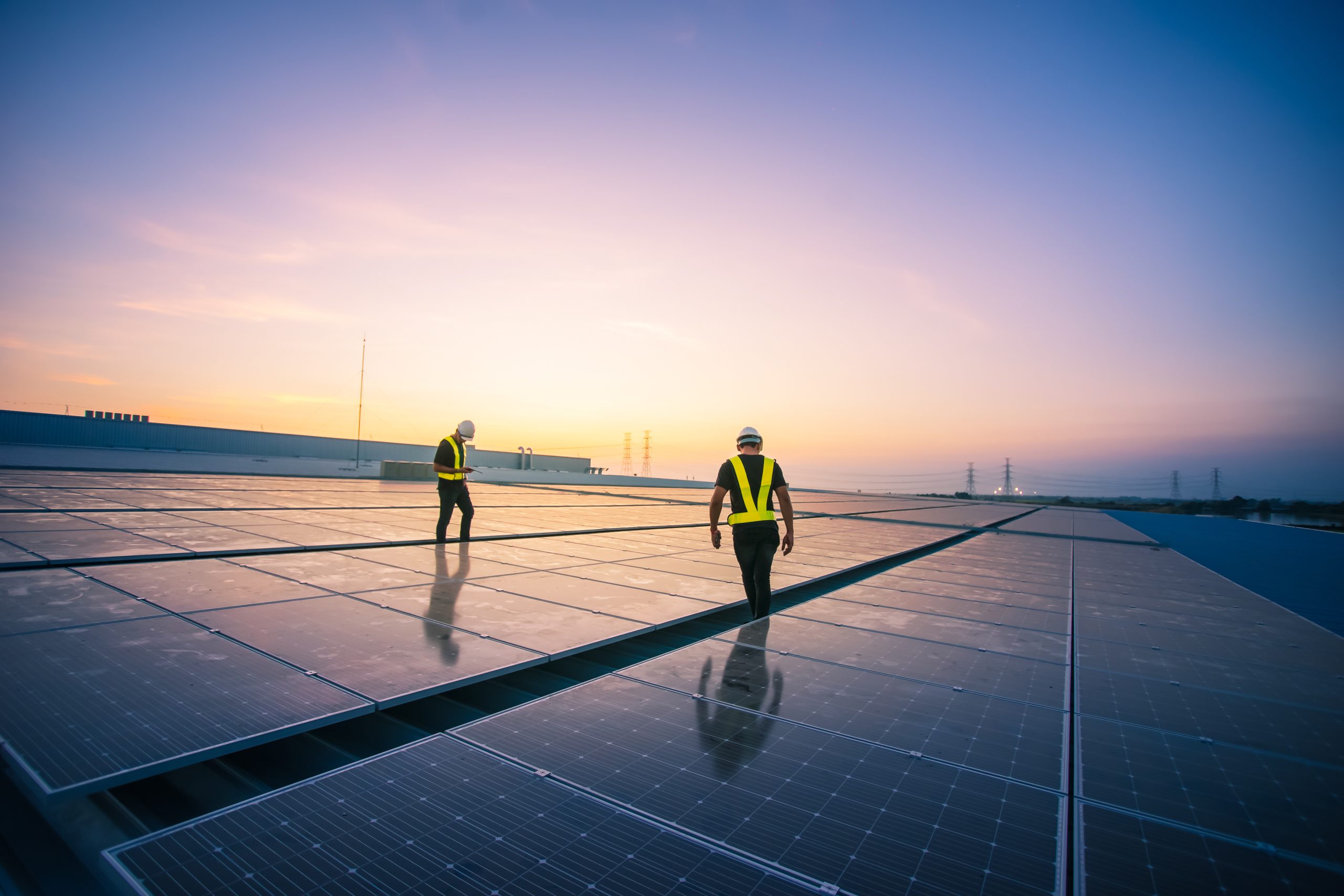Across the UK, commercial landlords are being asked to deliver more than rental income, they’re expected to deliver ESG-aligned, future-proofed assets that meet both investor and occupier expectations. With rising regulatory scrutiny, evolving EPC standards, and growing tenant demand for verifiable sustainability, energy performance has become a value driver, not just a utility consideration.
While landlords may not pay the energy bills, solar PV represents a strategic investment that strengthens the long-term financial and environmental performance of their portfolios. It’s a lever that supports higher valuations, rent premiums, and regulatory compliance, all key components of a resilient asset strategy.

Driving Rent Premiums and Tenant Retention
Tenants are under mounting pressure to decarbonise their operations. Buildings that can demonstrate a credible path to net zero, including on-site renewable generation, are fast becoming properties of choice.
By integrating solar, landlords position their assets as part of a tenant’s sustainability solution rather than a barrier. This creates a strong commercial advantage:
- Premium rents for energy-efficient, ESG-aligned properties
- Longer lease terms and improved tenant retention through reputational alignment
- Lower vacancy risk, as tenants increasingly filter for renewable-ready spaces
Even where tenants capture the direct energy benefit, landlords capture the value premium through enhanced marketability and stronger lease performance.

Increasing Asset Value
Solar PV installations can significantly enhance a building’s capital value by improving its energy efficiency, EPC rating, and overall marketability. Properties with integrated renewable infrastructure are increasingly favoured by investors and occupiers alike, particularly as green finance and sustainable investment mandates expand.
Solar-equipped buildings are also seen as lower-risk, higher-quality assets, supporting valuation uplift through improved EPC scores and alignment with ESG investment criteria.
In a market where sustainability is tied directly to valuation, solar provides tangible evidence of progress and a measurable asset enhancement strategy.

ESG Benefits and Investor Appeal
For landlords managing large commercial portfolios, ESG reporting is no longer optional, it’s central to attracting investment, meeting disclosure obligations, and accessing preferential finance.
Solar energy delivers measurable ESG outcomes:
- Carbon reduction – On-site renewable generation directly cuts emissions.
- Transparency – Quantifiable, auditable performance data strengthens ESG reporting.
- Green finance alignment – Improved sustainability credentials enhance access to ESG-linked loans and investment capital.
These benefits make solar a visible, high-impact component of an organisation’s ESG narrative, demonstrating leadership and measurable progress toward net-zero commitments.

EPC Regulation Mitigation and Compliance Resilience
The UK’s tightening Minimum Energy Efficiency Standards (MEES) mean properties that fall short risk restrictions on letting or refinancing. Solar PV can play a pivotal role in lifting EPC ratings, helping landlords avoid stranded-asset risk and maintain full income potential.
In many cases, solar integration is one of the most effective and visible measures for achieving future EPC thresholds, reducing reliance on less predictable retrofit solutions. In this sense, solar not only mitigates compliance risk today but also strengthens long-term asset resilience.

Flexible Funding, Scalable Solutions
For commercial landlords, the investment case for solar PV is compelling. Well-designed systems can deliver double-digit annual returns, outperforming many traditional real estate investments while enhancing ESG performance and EPC ratings.
There are several funding routes available, each offering different levels of control, risk, and reward.
A. Landlord-Funded Options
The landlord finances the installation and passes benefits to the tenant through rent adjustments, lease extensions, or a power purchase agreement (PPA). Long-term operation and maintenance (O&M) responsibilities should be clearly defined from the outset.
1. Landlord Capex
The landlord invests directly in the system and can recover or monetise the cost through:
- Rent Adjustment – Recover costs via a structured rent increase or service charge while tenants benefit from lower-cost, renewable electricity.
- Lease Extension Incentive – Use solar PV as a strategic negotiation tool to encourage lease renewals or extensions while delivering energy savings and boosting the asset’s sustainability profile.
2. Landlord PPA
The landlord installs and owns the system, selling electricity directly to the tenant at a discounted rate compared to grid import.
This provides a predictable income stream and improves tenant retention, though it introduces additional administrative responsibilities such as billing and ongoing O&M management.

B. Tenant-Funded Options
The tenant funds and typically owns the system, benefiting from all generated energy and available tax reliefs (often worth around 25% of capital costs through capital allowances). O&M obligations sit with the tenant.
- Tenant Capex – The tenant self-funds the investment, capturing energy savings and tax benefits while assuming full maintenance responsibility.
- Fully Funded Solutions – When capital budgets are constrained, third-party finance enables installation with zero upfront cost. These models are typically cash-flow positive from day one, with electricity savings exceeding financing or PPA payments.

Practical Considerations
Clear definition of long-term maintenance responsibilities is essential. In most cases, it is practical for the tenant to manage O&M under existing building maintenance obligations.
Landlords should also consider the legal and administrative complexity of each route.
A licence to alter under a tenant-funded model is generally simpler than funding arrangements involving land registry charges or security interests, which may complicate future disposals or refinancing.

A Strategic Imperative for Forward-Looking Landlords
The message is clear: solar PV is not just an environmental gesture — it’s a strategic investment in portfolio performance.
Solar offers a proven pathway to:
- Increase asset value
- Command higher rents
- Deliver credible ESG performance
- Mitigate EPC and compliance risk
In a market where sustainability and value are inseparable, solar provides the strategic edge that enables landlords to secure long-term returns and build resilient, future-ready portfolios.

Partner with Ineco Energy
At Ineco Energy, we help landlords and occupiers unlock measurable value through solar and energy-efficiency solutions. Our team combines technical expertise with commercial insight to ensure every project delivers maximum return.
We provide:
- Detailed feasibility studies and business-case modelling
- Full project development, including consents and approvals
- Tailored system design and installation
- Ongoing performance monitoring and maintenance services
Whether you manage a single asset or a nationwide portfolio, we can help you meet ESG goals with confidence.
Ready to explore how solar could transform your portfolio’s performance?
👉 Contact Ineco Energy today for a free commercial solar assessment.
Written By
Angus Rose
Director at Ineco Energy
Angus Rose is a Director at Ineco Energy, bringing over a decade of expertise in delivering innovative energy solutions to public and private sector clients. Passionate about renewable energy and its critical role in addressing climate change, he is committed to driving a sustainable future. In 2016, Angus co-founded Ineco Energy with a clear mission: to deliver clean energy for better business and a better world. Under his leadership, the company has become a trusted partner in the renewable energy sector, specialising in commercial and industrial rooftop solar projects. From initial consultation to project completion, Ineco Energy manages the entire lifecycle, ensuring seamless execution and long-term impact. With a strong focus on energy efficiency and sustainability, Angus continues to lead initiatives that help businesses reduce their carbon footprint and reliance on the grid while maximising financial benefits.




